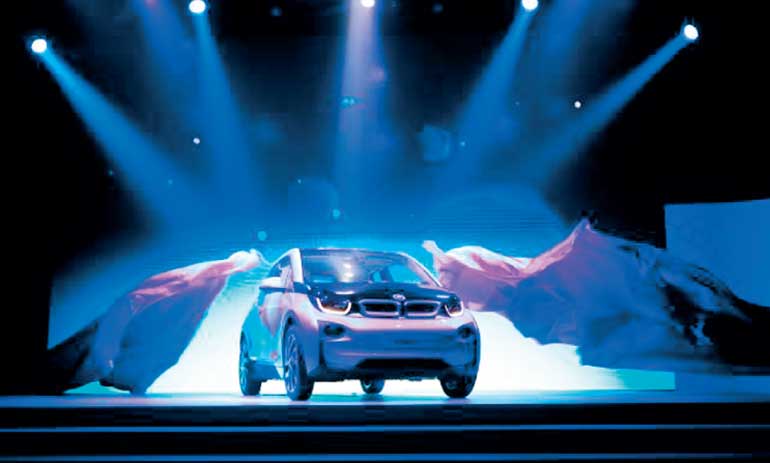Sunday Feb 22, 2026
Sunday Feb 22, 2026
Tuesday, 7 June 2016 00:03 - - {{hitsCtrl.values.hits}}
Reuters: BMW has transformed its “i” division into a development centre for self-driving cars, a board member told Reuters, a major strategic shift for the unit previously focused on making a family of lightweight electric vehicles.
While Tesla’s Model 3 will hit showrooms in 2017, and as rivals Porsche and Audi are working on all-electric cars for release by 2019, the German carmaker appears to have put such cars on the back burner. Its next fully-electric car is not due until 2021.
The company has changed tack after its only fully battery-powered car, the i3, failed to gain traction with the public, with only 25,000 sales last year. By contrast, Tesla has already received more than 370,000 orders for its Model 3.
 BMW's first all-electric car, i3, is unveiled at a ceremony in Beijing – REUTERS
BMW's first all-electric car, i3, is unveiled at a ceremony in Beijing – REUTERS
Now, rather than seeking to match the likes of Tesla and Porsche with a new zero-emissions sports limousine for release within the next two years, its main focus will be on developing an electric car with the next generation of technology: autonomous driving.
In an interview at the company’s headquarters in Munich, BMW board member Klaus Froehlich, who is in charge of development, said he had relaunched the i division in April as a unit devoted to producing cars that drive themselves.
“It is now in ramp-up stage. We call it Project i Next.”
The revamp also follows at least four high-profile staff defections from the division this year. Dirk Abendroth, manager of BMW’s “i” powertrain group, Henrik Wenders, vice president product management BMW “i”, and Carsten Breitfeld, vice president engineering, head of the i8 vehicle programme, were poached by a Chinese electric vehicle startup.
As part of its autonomous driving push, BMW is hiring experts in machine learning and artificial intelligence. It is also integrating the functions of existing computer driven assistance systems like cruise control, emergency braking, lane-keeping support and automatic parking.
With a fully autonomous vehicle, BMW could launch a ride-hailing business without having to pay drivers, Froehlich said, giving carmakers a competitive edge over new ride-hailing companies like Uber and Lyft which are eroding car sales by making part-time use as convenient as ownership.
Earlier this month Toyota Motor Corp said it would invest in Uber, and Volkswagen announced a $300 million investment in Gett, a smaller ride-sharing company.
BMW too may partner with a ride-hailing firm, particularly in markets like China, but the Bavarian carmaker’s strategy on potential partnerships with companies in this space is still being worked on, Froehlich said.
Sales of highly autonomous vehicles - ones where permanent active input from the driver is not required - are not expected to gain traction until 2020, but could then rise to around 9 million a year by 2025, according to analysts at Exane BNP Paribas.
China, the world’s largest car market, is likely to be the market where autonomous cars will first emerge on a large scale, Froehlich said.
“China is extremely fast implementing technology. Last year more electric cars were sold in China than in all the other global markets combined,” he added.
BMW is also considering expanding in the area of reserving parking spaces and electric car charging stations over mobile phones, a market which is still fragmented within countries. The carmaker has already invested in ParkNow and Parkmobile, two digital parking and payment services.
“We want to actively participate in a consolidation process,” Froehlich said.